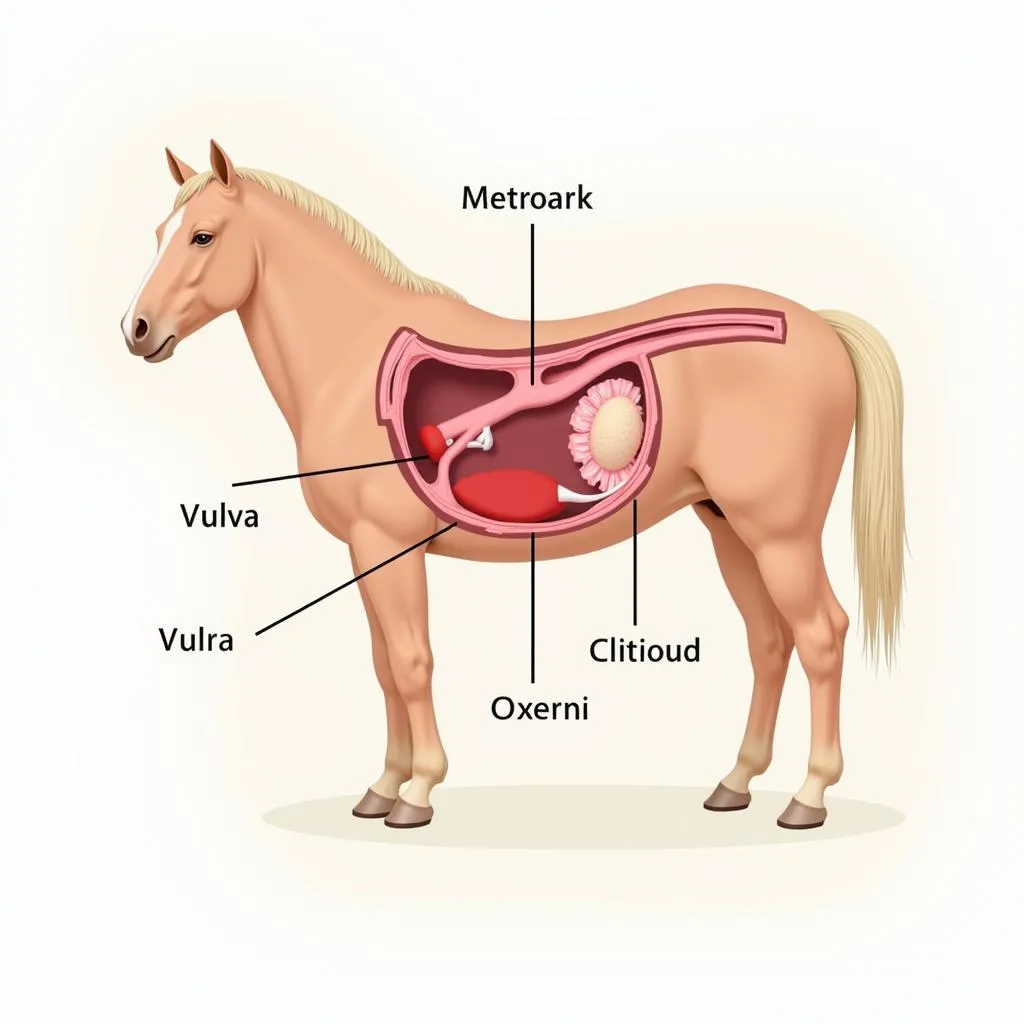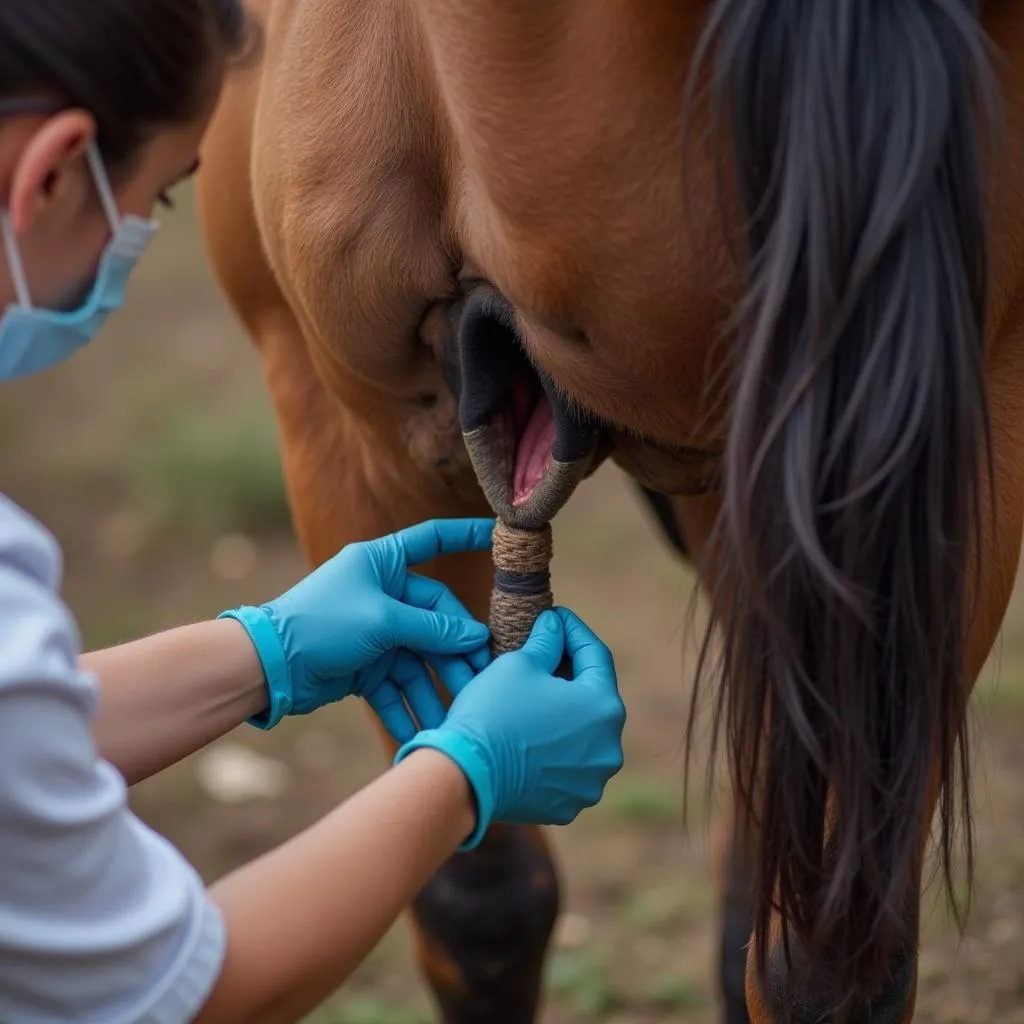Understanding the intricacies of your horse’s reproductive system is crucial for responsible ownership. This guide delves into the essential aspects of Horse Vaginal health, equipping you with the knowledge to ensure your companion’s well-being.
 Horse Vaginal Anatomy: A Visual Guide
Horse Vaginal Anatomy: A Visual Guide
Recognizing a Healthy Horse Vagina
A visually healthy horse vagina presents specific characteristics:
- Cleanliness: The area should be free from excessive discharge, dirt, or debris.
- Color: Typically, the mucous membranes will be a healthy pink, similar to the color of a dog’s gums.
- Moisture: A certain degree of moisture is normal, but it should not be excessive or foul-smelling.
- Position: The vulva should be held tightly closed, especially in mares that are not in heat.
Common Horse Vaginal Issues
Several conditions can impact horse vaginal health. Recognizing the signs early is vital:
Vaginitis
Inflammation of the vagina, or vaginitis, often presents with:
- Discharge: This may be white, yellow, or even bloody.
- Swelling: The vulva may appear swollen or irritated.
- Discomfort: Your horse may urinate frequently or show signs of pain when urinating.
Causes: Bacterial or fungal infections, trauma, or irritation from urine scald.
Urine Pooling
This occurs when the vulva doesn’t seal properly, allowing urine to collect in the vagina.
- Post-foaling Mares: Common after giving birth due to relaxed muscles.
- Older Mares: Age-related muscle weakness can contribute.
Complications: Chronic urine pooling increases the risk of infections.
Uterine Infections
Infections in the uterus can manifest as vaginal discharge and inflammation.
- Post-breeding: A risk period for mares, especially if hygiene protocols aren’t followed.
- Compromised Immune Systems: Mares with weakened immunity are more susceptible.
Importance of Veterinary Care: Uterine infections can be serious and require prompt veterinary attention.
Tumors
While less common, tumors can affect the vaginal area in mares.
- Melanomas: Gray horses are particularly prone to developing these tumors.
- Squamous Cell Carcinomas: These tumors can arise in the vulva or vagina.
Early Detection: Regular veterinary checkups and prompt attention to any abnormal growths are essential.
 Veterinary Examination of Horse Vagina
Veterinary Examination of Horse Vagina
Maintaining Your Horse’s Vaginal Health
Proactive steps can help safeguard your horse’s reproductive well-being:
- Hygiene: Regularly clean the vulva and surrounding area with mild soap and water. This is especially crucial after foaling or breeding.
- Nutrition: Provide a balanced diet to support overall health and immune function.
- Routine Veterinary Care: Schedule annual wellness exams, including reproductive health checks.
- Post-foaling Care: Ensure proper hygiene and monitor for signs of infection after your mare gives birth.
- Breeding Management: Follow strict hygiene protocols during breeding to minimize the risk of infections.
- Observe and Report: Be vigilant for any changes in your horse’s vaginal health and report any concerns to your veterinarian immediately.
When to Consult Your Veterinarian
Prompt veterinary attention is paramount if you observe any of the following:
- Abnormal vaginal discharge
- Foul odor
- Swelling or redness around the vulva
- Frequent urination or straining to urinate
- Behavioral changes, such as tail swishing, kicking at the abdomen, or reluctance to move
FAQs about Horse Vaginal Health
1. How often should I clean my horse’s vulva?
Ideally, clean the area daily with mild soap and water. Pay extra attention after foaling or breeding.
2. What kind of discharge is normal after foaling?
Initially, a reddish-brown discharge called lochia is normal. It should gradually become clear and watery within a few days.
3. Can I use human hygiene products on my horse?
No, human hygiene products can disrupt the delicate pH balance of your horse’s vaginal area. Use only products specifically designed for horses.
4. My mare is in heat. Is it normal for her vulva to be swollen?
Yes, some swelling and relaxation of the vulva are normal during heat cycles. However, if you notice excessive swelling, redness, or discharge, consult your veterinarian.
5. My horse is urinating more frequently than usual. Should I be concerned?
Increased urination can be a sign of various health issues, including urinary tract infections, kidney problems, or Cushing’s disease. Contact your veterinarian for a proper diagnosis.
 Seeking Expert Advice on Horse Vaginal Health
Seeking Expert Advice on Horse Vaginal Health
Seeking Expert Guidance for Your Horse’s Well-being
Maintaining your horse’s vaginal health is essential for her overall well-being and reproductive soundness. By understanding the anatomy, recognizing potential issues, and practicing diligent care, you can contribute significantly to a long and healthy life for your equine companion. Remember, early detection and timely veterinary intervention are crucial for addressing any concerns and ensuring your horse’s optimal health.
For any questions or concerns about your horse’s vaginal health, contact our expert team at Justus Horses USA at 0772127271 or [email protected]. We’re dedicated to providing exceptional care for your equine partners. We’re conveniently located at QGM2+WX2, Vị Trung, Vị Thuỷ, Hậu Giang, Việt Nam, and offer 24/7 support.
Explore more informative articles and resources on horse health and care at JustusHorsesUSA.com.